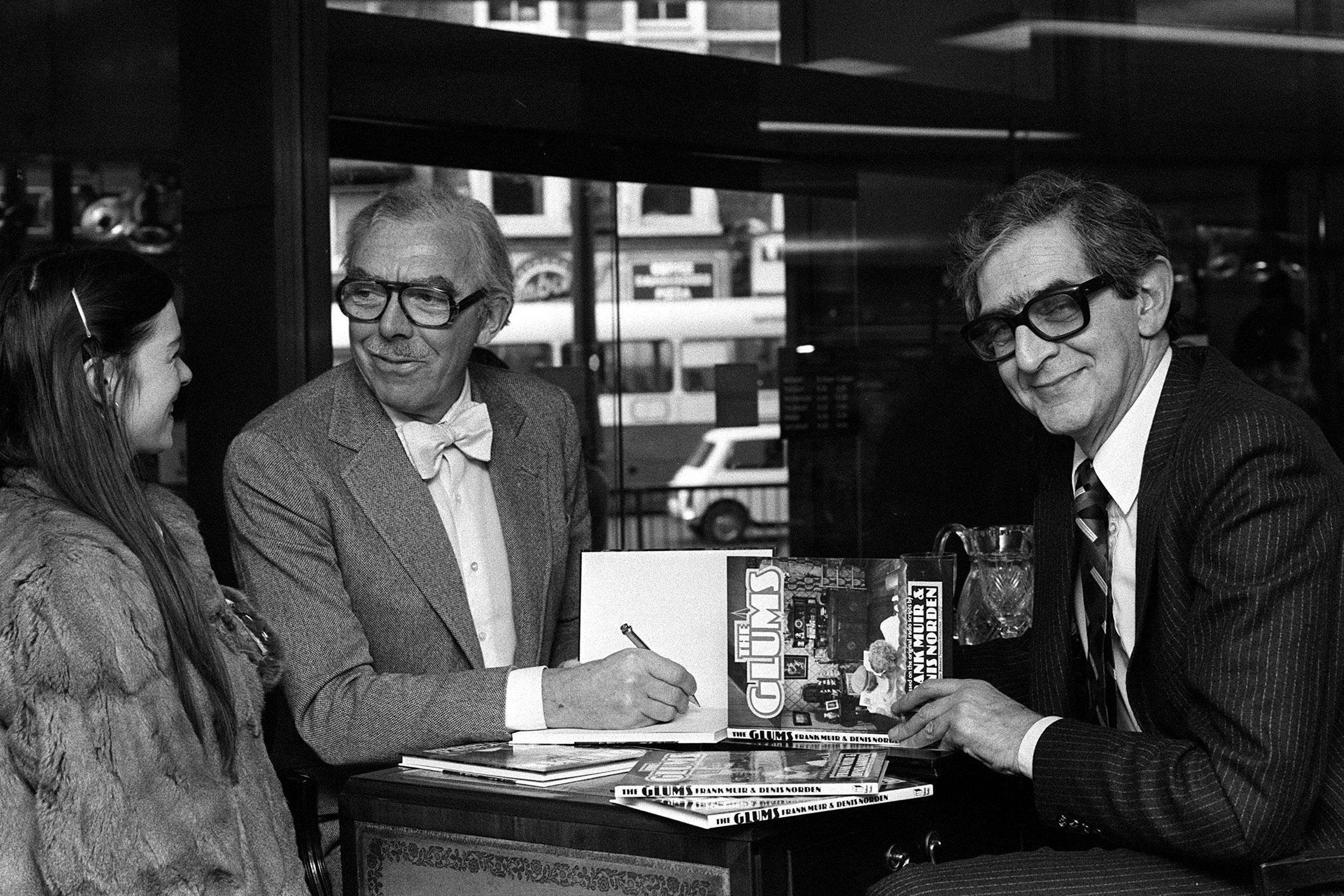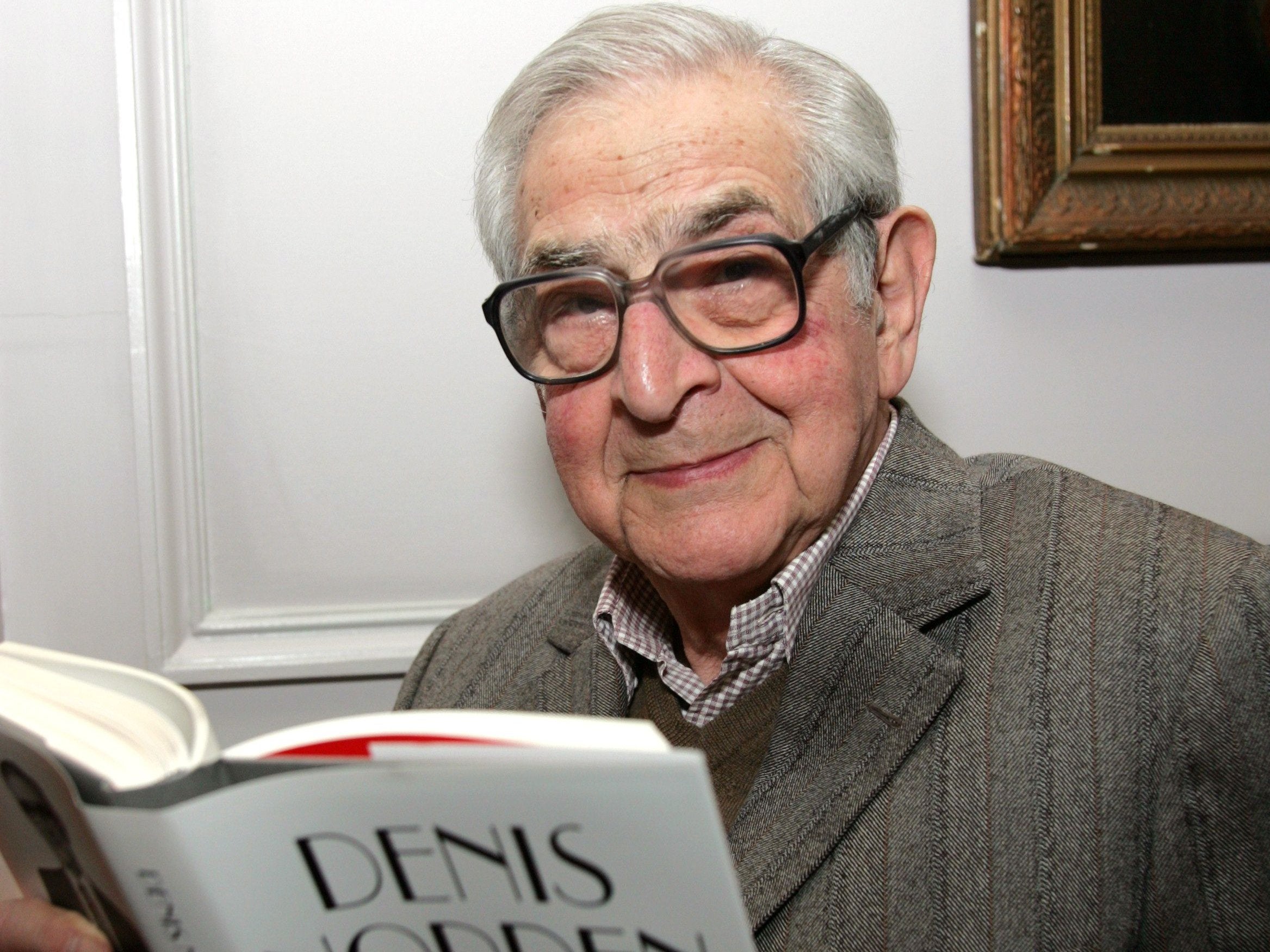Denis Norden: Comedy writer who became a much-loved TV presenter with It'll Be All Right on the Night
While he became a household name fronting a show about bloopers, Norden was a brilliant comedian and one half of a legendary comedy-writing partnership

Your support helps us to tell the story
From reproductive rights to climate change to Big Tech, The Independent is on the ground when the story is developing. Whether it's investigating the financials of Elon Musk's pro-Trump PAC or producing our latest documentary, 'The A Word', which shines a light on the American women fighting for reproductive rights, we know how important it is to parse out the facts from the messaging.
At such a critical moment in US history, we need reporters on the ground. Your donation allows us to keep sending journalists to speak to both sides of the story.
The Independent is trusted by Americans across the entire political spectrum. And unlike many other quality news outlets, we choose not to lock Americans out of our reporting and analysis with paywalls. We believe quality journalism should be available to everyone, paid for by those who can afford it.
Your support makes all the difference.Denis Norden, who has died aged 96, was latterly known for his gentle humour on shows such as It’ll Be Alright On The Night, but in his heyday, he was a revolutionary and daring comedian.
Far from the wry asides and chuckles which peppered his presentation of his compilation shows of “bloopers” – in the age before YouTube – and his tabloid title as King Of The Clanger, Norden was originally behind the jokes of many of the comedians of the late 1940s, before dominating radio and TV comedy in partnership with the late Frank Muir.
Muir and Norden enjoyed a highly productive 17-year writing partnership, during which they penned such legendary BBC radio comedy shows as Bedtime with Braden and Take It From Here.
Take It From Here was Muir and Norden’s most original and adventurous show, and led to spats even with the pre-dumbing down BBC over such questions as whether or not the audience would have heard of Picasso. The show started out by receiving, in Norden’s words “a bit of a bashing” but ended with “a generally favourable audience reaction”.
Muir and Norden’s fame in their day cannot be underestimated. Muir once commented: “A year after starting, our press cuttings said, ‘Without question, Britain’s leading comedy writers’.”
“We had,’ he added self-effacingly, “one year of the exhilaration of climbing and 23 years’ experience of slipping.”
The pair later went on to script TV shows such as And So To Bentley (1954), The Seven Faces of Jim (1961-63) and Whack-O! with Jimmy Edwards.
Denis Norden was born in the early Twenties in Hackney, east London, to George Norden and Jenny Lubell. Denis never had any interest in following his orthodox Jewish father into the family gown-manufacturing business, something that perplexed his father even after Denis had become hugely successful.

He showed academic promise as a child, winning a scholarship from Craven Park primary school to the City Of London School. As a boy, he was sometimes beaten up by fascist Mosleyites in east London, but managed to concentrate on his education, and matriculated able to speak passable French and Spanish.
This linguistic ability led to him getting the chance to go to the Spanish Civil War with a journalist and train in newspaper reporting. Norden was keen to go, but his parents put their foot down. In rebellion, he refused to continue his education and went to see the Hyams brothers – Phil, Sid, and Mick – who owned cinemas all over London, to ask if they could employ him in some capacity where he could write.
They promised him a job in publicity, but insisted he start by learning the entertainment business from the ground up. He was then set to work in a cinema as, variously, a boiler cleaner, electrician, stagehand, projectionist, usher and even in the drawing department of a cinema architect.
He ended up in his late teens as assistant manager of the Trocadero in south London’s Elephant and Castle, where a typical evening would include two films and variety acts by the likes of Flanagan and Allen and Sophie Tucker.
Spending all day and evening at the Trocadero gave him a valuable opportunity to study audience reactions and what makes them laugh.
After moving to manage a cinema and a variety theatre in Watford, he was also finally given the writing experience he craved, as the author of the text that accompanied slides that illustrated cinema organists’ performances.
Norden was called up to the RAF in 1941, where he became a wireless operator. He would spend long nights writing comedy material on his message pads, which all came in useful after the D-Day landings, when he was put to work organising and writing for revue groups all over Europe.
After the war Norden joined a variety agency as a staff writer, once adding up that during his two year stint there he wrote for 163 different comedians. Through the agency, he met Muir.
Norden realised he and Muir shared the same sense of humour when he went to see a rather dry film about the French Revolution and heard only one other person laughing at the bit he found funny. It was Muir. The two went on to form their partnership and garner great respect as the back room boys of comedy.
Norden and Muir were the resident guests on many radio and TV panel games – one of which, My Word!, ran for almost 40 years.
In 1961 the pair jointly received the Screenwriters Guild Award for best contribution to light entertainment, and then in 1978, The Variety Club of GB Award for best radio personality.
Norden’s increasingly successful entertainment career continued to baffle his parents. He was asked once by the London Evening Standard to review a book called Rationale of the Dirty Joke. Anxious to shine at whatever he did, he spent six days producing 600 words.
“When the review was published, I was inordinately proud. I popped down to see my parents and they were sitting there with the Evening Standard and their faces were rather bleak. My mother said, ‘So this is what it’s all come to – you’re the expert on dirty jokes.’”
When Muir and Norden’s collaboration ended – Norden had come to believe his name was “and Denis Norden” – Muir went into the executive side of TV which he discovered he loved, while Norden, after a four year stint as consultant to the BBC Television Light Entertainment Dept, decided he didn’t.

Norden continued in his solo career as a writer of TV and films such as The Bliss of Mrs Blossom (1968), Buona Sera, Mrs Campbell (1968), The Best House in London (1969) and Every Home Should Have One (1970).
He once said: “I don’t claim to have insights into our condition. If a man pays 4s 6d for a cinema seat, and I can give him anything up to 6s 3d worth of entertainment, and relieve the pattern of his anxieties, I think I can claim to have an honourable relationship with him.”
Muir and Norden joined forces again to write and perform in a 1970 series for Rediffusion called How To Be An Alien. It was not a great success, but this did not prevent the pair from subsequently penning several books together, including You Can’t Have Your Kayak and Heat It and The Complete and Utter ‘My Word!’ Collection.
Norden became a reluctant TV performer when he was talked into hosting Thames TV’s Looks Familiar in 1973 because it was ‘not funny enough for a comedian to do.’ He was uncomfortable with TV performing because, despite being noted for the calm and studied ease with which he delivered his witticisms, he disliked presenting, worrying so much about the quality of his material that he could become physically ill.
His trademark show, It’ll Be Alright On The Night, started in 1977. It was based on amusing outtakes from TV shows and commercials, which Norden compiled and presented. The hugely popular show spawned follow-ups such as It’ll Be Alright On The Day and Denis Norden’s Laughter File. In the late Nineties, when Norden presented 40 Years of ITV Laughter, he watched more than 800 hours of footage to get the comedy classics he wanted.
He continued appearing occasionally on TV into his 80s, but it was 1980 that marked the peak year for Norden professionally, as he was awarded Male TV Personality of the Year and made a CBE in the Queen’s birthday honours.
Denis Norden was physically imposing at 6ft 2in, a man who swam every morning before work and gave up smoking in the late 1970s when he realised he had been getting through 100 cigarettes a day. He also dieted at various points in his life, citing once that his ambition was to live to see the day when it was discovered that cottage cheese was in fact fattening.
Norden married Avril Rosen in 1943, with whom he had two children – Nick, an architect, and Maggie, a radio and TV presenter – who survive him.
Denis Norden, comedy writer, born 6 February 1922, died 19 September 2018
Join our commenting forum
Join thought-provoking conversations, follow other Independent readers and see their replies
2Comments